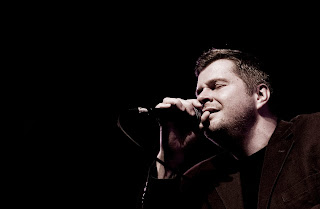A Vocalist's Survival Guide to Touring: Part 3 - Know Your Repertoire
You gotta know your songs. I am not referring to you mangling your lyrics or messing up the melody, or - heavens forbid - emote insufficiently or overly. I am referring to studying your songs purely on a muscle memory level. You won't have time or head space to focus on that aspect of song presentation when you're on stage.
| It's not a very popular notion, that. We all just want to burst onstage and sing our little hearts out, leaving our souls, and possibly a little bit of blood on the floor. And that's all good and dandy if you only have ONE gig and then two weeks to recover from it. | |
| Jazz Vocalist Beat Kaestli |
But to acquire consistency in your performance, and to enable you to present your music at its best to a different audience night after night, you've got to dig deeper. I'm going to go ahead and trudge out the well-worn but always useful analogy to the athlete here. Or better yet: the runner. Say, you love running. You do it all the time, in short, joyful spurts. You've got a race coming up, and you've got your little runner's outfit, and your fabulous runners' shoes that will simply make you look fast, even if you're not. And you know you can run 5k at a certain speed, but only once. In the upcoming event you have to run several events for several days in a row. But if you can do it once, surely you can do it again the next day, right? Wrong. If you haven't stopped to analyze your running technique to make sure your body knows how to move with utmost efficiency and the least wear and tear possible on the intricate system of muscles, tendons, joints and skeletal structure that keeps you upright in the first place, you'll be done after the first race. You'll be worn out. And then you'll need a serious recovery plan to even attempt another race the very next day.
What happens when we storm the stage and sing with emotion but, possibly, not with enough of a muscle/structural memory for how that particular song works within our vocal tract? Most of us engage the false vocal folds, which translates into constriction, which in turn results in a heavier load for those tiny tiny vocal folds. Too much effort on the level of our true vocal folds ensues, and we push out more air to keep the vocal folds vibrating, constrict more to make sure the vocal folds close properly, which in turn results in the need for more air etc...you get the picture. In the end the vocal folds are swollen, don't close properly and our beautiful sound, not to mention vocal health, goes out the window.
So here's a tip: take the song out of its emotional context and treat it like an exercise. Use whatever technique you've been working on and strip the song down to it's bare bones. You can either start with just the words, just the rhythm, or just the melody. I tend to focus on the melody and practice it on 'ng' - the one in "sing", not the one in "song", slowly, and progress from there on to shaping the words with my lips, jaw and tongue, adding just the vowels, adding the consonants, going through different voice qualities, in order to have the stylistic repertoire I need to interpret the song afresh every evening, etc. You get the idea.
It's a tedious process, but very worthwhile. Once you're onstage and in the thrall of the sheer energy of a live performance, it's too late to think about these things.
As always, feel free to comment, embellish, add helpful hints of your own below. Happy touring!



Wonderful advice Elizabeth! How about some tips on how to book gigs when you want to tour?
ReplyDeleteah well, that's a whole other can of worms. all i can tell you on that here is, it ain't gettin' any easier...
ReplyDelete